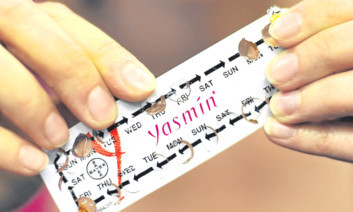
7% of all 12 to 15-year-olds are prescribed contraceptives by family doctors
Thousands of schoolgirls are being prescribed powerful contraceptive drugs by family doctors despite being well below the legal age of consent with girls as young as 12 are being given the pill, injections and implants by GPs.
New research lifts the lid on the sheer scale of underage girls aged 12-15 being prescribed hormonal contraception. Sex below 16 is illegal, but doctors will supply contraception to girls to stop them getting pregnant.
And worryingly, “patient confidentiality” rules mean the drugs can be given without parental consent so families may be totally unaware.
Little has been known about just how many Scottish schoolgirls are taking contraceptives until now, but this investigation has raised concerns sex among under-16s is widespread.
Last night family rights campaigners said girls were being encouraged to have sex they would later regret. But doctors insisted young patients were “fully counselled”.
Researchers from the University of Aberdeen looked at the patient records of almost 200 GP practices across Scotland, nearly a fifth of the total.
Over a 12-month period, around 7% of girls aged 12-15 were given contraceptives. This was mainly the contraceptive pill, but also included long-acting injections and implants and emergency contraception. This equates to around 17,000 girls across Scotland as a whole.
Dr Anusha Reddy, a researcher from the University of Aberdeen, led the study.
She said: “We know that there is a lot of underage pregnancy and there have been Government strategies put into place to tackle this issue. However, little is actually known about the provision of contraceptive services from general practice.
“This study provides important information about that provision. It’s obvious people are starting to use contraceptives from the age of 12.”
Most were given the contraceptive pill which is taken daily to prevent a pregnancy. Others received the implant in the arm, which can last for up to three years, or injections which last for up to 12 weeks.
The researchers don’t know each patient’s medical circumstances so can’t pinpoint exactly why the prescriptions were handed out. Girls can be prescribed medicines including the contraceptive pill for problems such as painful periods.
But as previous studies have shown 15% of Scottish girls have had sex underage, it is likely that many prescriptions are for girls who are sexually active.
Norman Wells, of the Family Education Trust, said: “Many girls have subsequently regretted their early sexual experiences, and testified that they’d never have embarked on an illegal sexual relationship under the age of 16, had it not been for the confidential provision of contraception.
“Providing contraception to young teenagers results in yet more underage sex, spiralling rates of sexually transmitted infections and young people carrying emotional baggage into adulthood.”
Scottish Conservative health spokesman Jackson Carlaw added: “The focus must be on acting against sexually transmitted diseases and unwanted teenage pregnancies. It may not be ideal that GPs are taking this action, but we must also recognise the reality of life in Scotland today. What this report does illustrate is that current education messages on this subject are failing miserably.”
A spokeswoman for the British Medical Association, which represents GPs, insisted the numbers were “small”, including “clinical reasons, such as very painful periods”.
She added: “The patient will be fully counselled by the GP and encouraged to involve a parent or carer in this decision.”
A Scottish Government spokesman said: “It is for doctors, in consultation with patients, to offer advice on the most suitable method of contraception.”

Enjoy the convenience of having The Sunday Post delivered as a digital ePaper straight to your smartphone, tablet or computer.
Subscribe for only £5.49 a month and enjoy all the benefits of the printed paper as a digital replica.
Subscribe